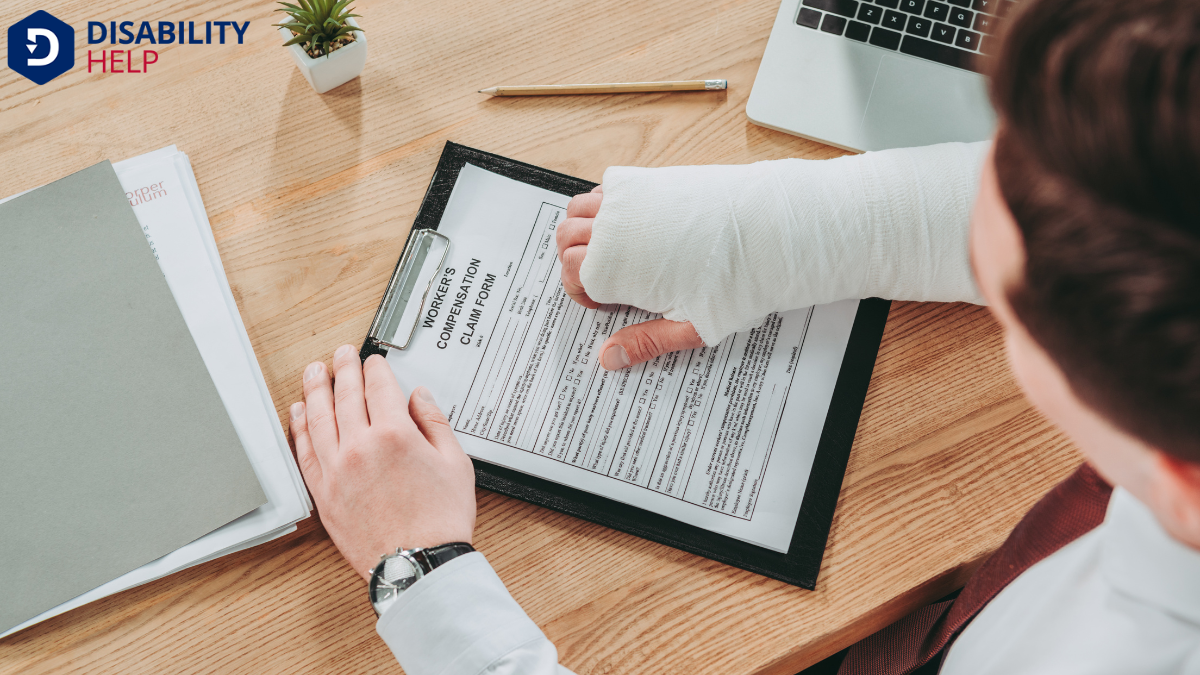Let's clarify how short-term disability insuranceInsurance that provides income replacement for a limited time when an employee is unable to work due... and workers' compensation work together. Short-term disability helps us during non-work-related illnesses or injuries, while workers' compensation covers us for work-related incidents. If we're injured at work, workers' compensation applies; otherwise, short-term disability might be used. Sometimes, both could apply depending on circumstances, like overlapping coverage details. Understanding this interplay guarantees we receive appropriate benefits when needed. Dive further to uncover more nuances.
Key Takeaways
- Short-term disability insuranceA form of insurance that provides income to individuals who are unable to work due to a disability. covers non-work-related conditions, while workers' compensation covers work-related injuries or illnesses.
- Workers' compensation benefits are mandatory and employer-funded, whereas short-term disability insurance is often optional for employees.
- Overlapping coverage requires understanding policy terms to determine if concurrent benefits are allowed or offset each other.
- Employees should file separate claims for short-term disability and workers' compensation, ensuring correct categorization of the injury or illness.
- Employers must provide clear information and support to employees regarding the interaction and coordination of these benefits.
Understanding the Basics of Short-Term Disability Insurance
Short-term disability insurance is essential for anyone seeking financial security during unexpected periods of illness or injury. It provides us with a safety net by replacing a portion of our income if we're unable to work for a short duration due to health issues.
Typically, this type of insurance covers conditions like recovery from surgery, severe illness, or significant injury.
We must understand that short-term disability insurance is designed to cover temporary, not permanent, disabilities. Policies often have specific waiting periods before benefits begin, usually ranging from a few days to a couple of weeks.
The coverage duration can vary, commonly lasting from three to six months, based on our chosen policy. By having this insurance, we guarantee our financial stability isn't compromised during tough times.
Key Features of Workers' Compensation

While maneuvering workplace safetyThe policies and practices in place to ensure the physical and mental well-being of all employees, i..., we must recognize the critical role workers' compensation plays in protecting employees. This system provides essential benefits when we're injured or become ill due to work-related activities. It covers medical expenses, ensuring we receive necessary treatment without financial strain.
Additionally, workers' compensation offers wage replacement, typically two-thirds of our regular income, helping us manage bills during recovery.
Importantly, it promotes a no-fault approach, meaning we receive benefits regardless of who caused the accident. This framework encourages quick and fair resolution, reducing the need for lengthy legal battles.
Moreover, by providing rehabilitationThe process of helping individuals with disabilities achieve and maintain their optimal physical, se... services, it aids our return to work as soon as we're able. Understanding these key features empowers us to appreciate the protection workers' compensation offers.
Differences Between Short-Term Disability and Workers' Compensation
Although workers' compensation provides significant benefits for work-related injuries or illnesses, it's important to distinguish it from short-term disability insurance, which serves a different purpose.
Workers' compensation covers medical expenses and lost wages when injuries or illnesses occur on the job. It’s a mandatory benefit, typically funded by employers, to guarantee we're protected at work.
On the other hand, short-term disability insurance covers a portion of our income if we're unable to work due to non-work-related injuries or illnesses.
It's often optional and may be offered through our employer or purchased individually. This insurance helps us manage financial needs during recovery periods for personal health issues.
Scenarios Where Both Benefits May Apply
Let's explore situations where both short-term disability insurance and workers' compensation might be relevant for us.
Sometimes, we might qualify for both benefits due to overlapping coverage rules, but it's important to understand that the claim processes for each can differ considerably.
Dual Benefit Eligibility
How often do we find ourselves wondering if it's possible to receive both short-term disability insurance and workers' compensation at the same time?
Let’s explore this dual benefit eligibility. In some scenarios, we might be eligible for both benefits, but it’s not as straightforward as collecting two checks.
Typically, workers' compensation covers work-related injuries, while short-term disability insurance applies to non-work-related conditions.
However, there are situations where both may intersect. For instance, if we've a work-related injuryAn injury that occurs in the course of employment, potentially leading to temporary or permanent dis... and our workers' compensation claims face delays, short-term disability insurance might temporarily fill the gap.
Understanding eligibility for both involves examining the specifics of our policies and the nature of our injury or illness, ensuring we maximize the support available.
Overlapping Coverage Rules
When traversing the complex landscape of overlapping coverage rules, it’s essential to understand how both short-term disability insurance and workers' compensation can occasionally apply to the same situation.
For instance, if we experience a workplace injury, workers' compensation typically steps in first. However, if our injury isn't promptly recognized as work-related, short-term disability might temporarily cover our income.
It's vital to note that these benefits aren’t designed to function simultaneously. Most policies guarantee we don’t receive more than our usual salary.
Consequently, if both coverages apply, one may offset the other's benefits. This prevents overcompensation while making sure we're supported.
Understanding how these systems interact helps us navigate our options during challenging times without financial strain.
Claim Process Differences
Maneuvering the claim process for short-term disability insurance and workers' compensation can be perplexing, especially in scenarios where both benefits might apply.
When facing an injury or illness that could fall under both, we must first determine the coverage type required. Workers' compensation is typically for work-related injuries, while short-term disability handles non-work-related situations.
Filing claims for both simultaneously requires careful attention to detail and documentation, ensuring that we meet the criteria for each. It’s essential to communicate with both insurers to avoid overlaps or conflicts, as some policies may not allow concurrent benefits.
Steering through this process requires understanding the specific terms and timing each claim appropriately, ensuring we receive the benefits we’re entitled to without unnecessary delays.
Filing Claims for Short-Term Disability and Workers' Compensation

When we're filing claims for short-term disability and workers' compensation, understanding the eligibility criteria is essential.
We'll need to gather the right documentation and evidence to support our claims effectively.
Coordinating benefits can seem complex, but with a clear process, we can manage our claims efficiently.
Claim Eligibility Criteria
Maneuvering the claim eligibility criteria for short-term disability insurance and workers' compensation can initially seem intimidating, but understanding the fundamentals simplifies the process.
Let’s break it down so we can confidently tackle this together. When filing claims, we need to grasp the distinct eligibility requirements for each type of coverage. Short-term disability typically covers non-work-related injuries or illnesses, while workers' compensation applies to work-related incidents.
Here’s what we should focus on:
- Nature of the Injury or Illness: Identify whether it’s work-related or not.
- Employment Status: Confirm that employment is active and the insurance policy is in effect.
- Waiting Periods: Be aware of any mandatory waiting periods before benefits kick in.
Documentation and Evidence
Gathering the right documentation and evidence is essential when filing claims for short-term disability and workers' compensation. We need to guarantee our paperwork is complete and accurate to avoid delays or denials.
First, let's obtain medical reports detailing our diagnosis, treatment, and the expected duration of our disability. These reports support our claim, demonstrating the necessity for benefits.
Next, we'll need to gather any incident reports or witness statements if applicable, especially for a workers' compensation claim. These documents validate that the injury or illness occurred at work.
We should also keep records of any related expenses, such as medical bills or travel costs.
Benefits Coordination Process
After assembling all necessary documentation and evidence, let's tackle the benefits coordination process for filing claims for short-term disability and workers' compensation.
Steering through this process can be a bit complex, but we'll break it down into clear steps for you.
First, understand that these two benefits are separate; they require individual claims and communication with both insurance providers and employers.
Here's a concise guide to help us coordinate these claims effectively:
- Evaluate Eligibility: Verify that we meet the specific criteria for both short-term disability and workers' compensation benefits.
- Submit Claims Promptly: File each claim as soon as possible to avoid delays and guarantee timely benefits.
- Communicate Clearly: Keep open lines of communication with all parties involved to prevent misunderstandings and ensure smooth processing.
Employer Responsibilities and Obligations
Employers have a crucial role in ensuring their workers are adequately protected by short-term disability insurance and workers' compensation.
We must first provide clear information about these benefits, so employees understand what’s available and how to access them. It’s essential to maintain accurate records of employee coverage, which helps prevent any confusion when claims arise.
We’re also responsible for facilitating the claims process, making it as straightforward as possible. This means communicating with insurance providers and possibly advocating on behalf of employees.
Let’s not forget about training staff on safety practices to prevent workplace injuries, ensuring a safer environment for everyone.
Legal Considerations and Requirements
While maneuvering through the intricacies of short-term disability insurance and workers' compensation, understanding the legal factors and requirements is vital.
We must be aware of how these benefits interact to guarantee we're fully compliant and adequately protected. It's important to grasp the distinctions in eligibility criteria, as each program has unique legal mandates.
By being informed, we can navigate potential pitfalls and make informed decisions. Here's what we need to take into account:
- State Regulations: Each state has specific laws governing how these benefits can be claimed and utilized.
- Eligibility Criteria: Workers' compensation and short-term disability insurance have different qualifying conditions.
- Documentation: Proper paperwork is essential to validate claims and avoid legal complications.
Understanding these elements helps us effectively manage our benefits.
Managing Overlapping Coverage

Steering overlapping coverage between short-term disability insurance and workers' compensation requires careful consideration to maximize benefits. We must comprehend how these policies interact to avoid underutilizing or misapplying them.
First, let’s confirm the specifics of each policy. Workers' compensation typically addresses workplace injuries, while short-term disability might cover non-work-related illnesses or injuries.
We should verify if our policies allow concurrent benefits or if one offsets the other. Some policies may require us to exhaust workers' compensation before short-term disability kicks in.
It’s essential to communicate with HR or our insurance providers to clarify these terms. By maneuvering these nuances, we can guarantee we’re fully covered and minimize any potential financial gaps during recovery.
Resources for Employees Seeking Assistance
Steering through the complexities of short-term disability insurance and workers' compensation can be intimidating, but knowing where to find help makes a significant difference.
We're here to guide you toward resources that can ease this journey. First, reach out to your company's human resources department. They're equipped to clarify policies and guide you through procedures.
- Company's HR Department: They can provide specific information and support tailored to your situation.
- State Workers' Compensation Board: Visit their website for detailed information about your rights and benefits.
- Legal Aid Services: Consider consulting with a legal expert specializing in labor laws if you face disputes or require deeper insights.
Conclusion
In traversing the complexities of short-term disability insurance and workers' compensation, we must be informed and proactive. These benefits serve different purposes, but understanding their differences and how they might overlap is vital. By knowing our rights and responsibilities, consulting resources, and effectively managing claims, we can guarantee we're well-prepared. Let's stay informed and seek assistance when needed, so we can make the most of the support available to us in times of need.






